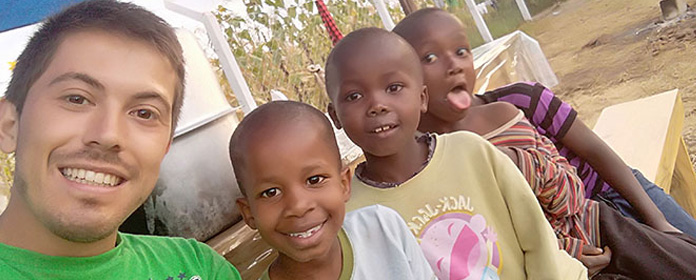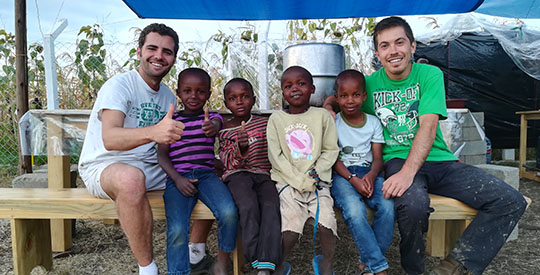News
LATEST NEWS AND EVENTS FROM THE SCHOOL OF ENGINEERING
Luis Alarcón: "The world is unfair. We have helped a little in the summer, we have had our picture taken, but we go back to our comforts and they are still there without them."
The student Luis Alarcón narrates the experience of volunteer activities international that he shared with other colleagues in Tanzania.

Guided by the instructions of a Chilean architect, several students from Tecnun collaborated during the month of July in the construction of a school for orphaned children in the Tanzanian town of Arusha. Installed in a camp set up by themselves, with tents and water tanks, they started their international volunteer activities experience at the end of June. The goal of the trip to Tanzania was to lay the first stones of a school that could help hundreds of children over the next few years. They flew there motivated by the idea of collaborating in whatever was needed and soaking up the African culture. And, in this sense, they are "enormously grateful" for the money they have received through a crowfunding campaign by friends and family, but also to those people who collaborated "without knowing them at all".
Once back in his native Cordoba, and shortly before leaving for the United States to carry out his project Master's Thesis, Luis Alarcón takes stock of this international volunteer activities experience that he has shared with his colleagues from Tecnun, Pablo Fraga and Alejandro López de Carrizosa.

Q. What was daily life like in Arusha?
We would wake up early and work until lunchtime. We would rest a little bit and go back to work in the afternoon. Always with local people from whom we learned a lot. They had much more stamina than us and Sebastián, the Chilean architect, always told us to work, but with our heads, as they were much more used to it. He took good care of us.
Q. Do you think it is important to have an international volunteer activities experience?
The volunteer activities is very important for any person because, while practicing it, you stop thinking only about yourself and open yourself to other realities. And perhaps that financial aid to extend it to our way of life to realize that we are happier when we think of others. The experience of volunteer activities international is very enriching because in addition to trying to lend a hand, you soak up the culture of the place. We have made Tanzanian friends with whom we continue to correspond. In any case, we also try to do volunteer activities during the course with the people around us, who are the ones you can really help if you put your mind to it.
Q. Were there hard times?
We started with a lot of enthusiasm, but it is true that the days were heavy. We slept in tents and also the bathrooms we are used to do not exist there, without going into more detail... Nor many of the things we are used to and that only a few have there, such as charging cell phones, having light at dusk, using water from the tap or shower... Sometimes it was hard, but we had such a good group of people that even when we were tired we knew how to invent a new joke.

Q. How did you feel when you returned home?
When we were on our way back it came to my mind how unfair the world is, that we've done a little bit in the summer, we've had our picture taken, but now we're back to our comforts and they're still there without them. However, I think that locking ourselves into that thought is not good either. The world is the way it is and we don't have the scope to change it between now and Christmas. In any case, we can bring back everything we have learned and apply it in our daily lives, each one where he or she has lived. The hospitality of those people, the generosity that when they have something, they share it with everyone, their expression of joy, even if inside they were having a hard time... The movie "Chain of Favors" comes to mind. It proposes the idea that, if each one of us financial aid helps 3 people, these 3 will help 3 others and thus we will have the capacity to change the world. That is why I think that we have to start helping the people around us.
Q. What do you take away from Tanzania?
The hospitality of the Tanzanians, because it was incredible. If I have to keep something, it has been that. Well, and also with the fighters that the women are there. They do it all and many times without financial aid. That has really caught my attention.
Q. Any anecdote that you will always remember?
I found agreement that one day we went to buy bread by car and saw from afar a huge church on top of a hill. It is not very common to see churches there so we went over to look around and saw that there were 3 gospel choirs rehearsing for Sunday mass. We drove some older ladies from the choir home because they had to walk more than an hour to get there. We were all squeezed together singing gospel music songs and it was very curious.
I also loved it when in the afternoons Masai boys of about 7 years old would come in, walk their cattle and get to work with us on the construction site. They did even better! Then, Alejandro would coordinate with them every afternoon to teach them to dance something different like the Macarena, the Waka Waka or the aserejé. He was very surprised because some of them were already dancing better than Shakira at the age of 8.

Q. Are you satisfied at the organizational level?
Yes, all the local organizers with whom we have lived with have gone out of their way to make our volunteer activities an incredible experience. For example, Mama Imani was the cook who spoiled us like her children, Asanteli was the master builder who taught us everything with a lot of patience and laughed all the time with us, and all the others. From Tantaka they were in charge of the communication with the people in charge of the NGO and they told them all those things that could be improved for the next volunteer activities .
